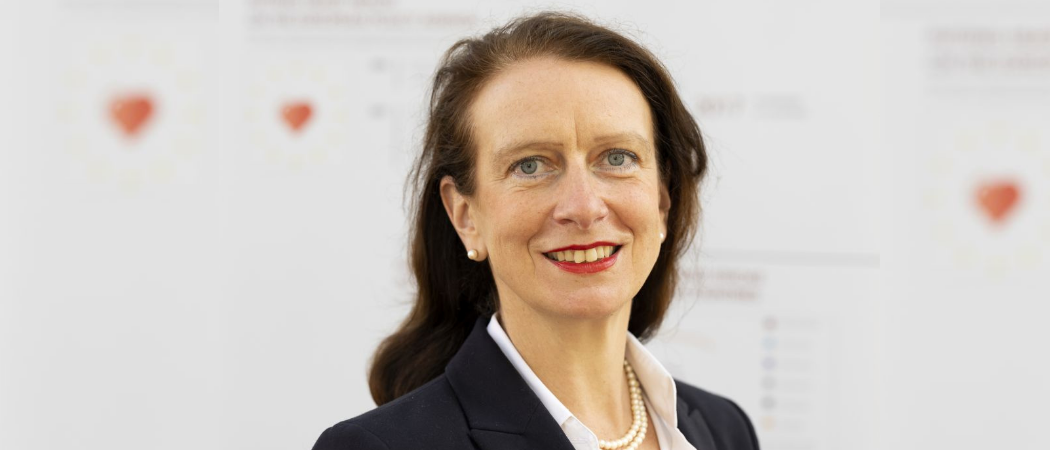Cardiovascular diseases account for over a third of all deaths in Europe. MEPs and others say Horizon Europe should draw on the example of cancer research to do more to tackle this burden

Birgit Beger, CEO of the European Heart Network. Photo: Smoke Free Partnership
The MEP Heart Group of MEPs, EU officials and health stakeholders, is urging the European Commission to issue targeted calls for cardiovascular disease research.
“There is an innovation gap […] in research and this needs to be addressed,” said Birgit Beger, CEO of the European Heart Network, at the launch of the call to action on Monday. Contributions are needed from Horizon Europe and the health programme EU4Health, she said.
On top of targeted calls covering the patient pathway from early detection to quality of life of people living with cardiovascular disease, the group wants a public private partnership for cardiovascular disease and better health data sharing tools.
Cardiovascular diseases cause 3.9 million deaths each year in Europe alone. While mortality has been falling in recent years, the rate of decline is slowing down. In some countries elsewhere in the world, include the US, mortality has started increasing.
In the next two years alone, the Commission plans to open 18 health research calls covering 48 topics in mental health, obesity, pandemics, and cancer. “But cardiovascular diseases are not mentioned,” said Hugo Katus, advocacy committee chair at the European Society of Cardiology.
In future Horizon Europe work programmes, the group wants to see calls covering the chain from basic to translational clinical research, a new public private partnership on cardiovascular disease focusing on the complete patient pathway from prevention to treatment, and work on infrastructure for health data sharing.
The group will also push for changes in the new €5.3 billion EU4Health programme. It wants investment to integrate cardiovascular patient registries around Europe, to improve access to real world data for research and policymaking. Alongside this, the Commission should encourage member states to set national strategies for cardiovascular disease and draw on the EU pharmaceuticals strategy to promote development new drugs.
Earlier in June, when the Commission set out how it will spend the first €300 million from the EU4Health budget this year, there was little on offer for the MEP Heart group. “If you have looked at it, you will be disappointed because there is not much on cardiovascular disease,” said Pierre Delsaux, deputy director general at the Commission’s health directorate.
Delsaux said the Commission had to rush the adoption of this year’s work programme after the long fight between the European Parliament and member states about the size of the overall EU budget caused delays in the launch of most funding programmes. In the end, the Commission had little time left for a consultative process and decided to settle on a smaller EU4Health budget for this year.
The officials hope to do better next year and are starting to work on the details of EU4Health’s 2022 programming this week. Delsaux invited the MEP Heart Group to take part in the consultation and propose projects. “Now is the moment to contact all the member states and the Commission to explain the importance of cardiovascular diseases, not only to say it’s important but to come up with concrete actions that could be financed,” he said.
Borrowing from cancer research
Earlier this year, the Commission set out the Beating Cancer Plan to reinforce cancer prevention, treatment and care. Within the next few weeks, news is expected of the Horizon Europe cancer mission, a massive research effort that promises to save three million lives by 2030.
Targeted efforts to promote cancer research have paid off, largely owing to public awareness. “We really need to learn from the cancer field. They are very effective,” said Katus. A programme similar to the Beating Cancer Plan could help tackle the burden of cardiovascular disease, he said.
EU research commissioner Mariya Gabriel showed support, but said such an initiative is outside her remit and EU health commissioner Stella Kyriakides would need to join the discussion.
Delsaux said some of the effort and funding put into cancer helps address the burden of other diseases. Public health and prevention is one example, with less smoking and obesity reducing the prevalence of both cancer and cardiovascular disease, he said.
Data sharing is another example. By the beginning of next year the Commission is expected to put forward a plan for a European Health Data Space, a shared repository, which will provide better access to data and enable cross border sharing of anonymised cancer patient data.
“The sooner we are able to deliver on this proposal, the sooner we will be able also to give a basis to try to improve research and innovation in all diseases, but certainly also in the field of cardiovascular diseases,” said Delsaux.





 A unique international forum for public research organisations and companies to connect their external engagement with strategic interests around their R&D system.
A unique international forum for public research organisations and companies to connect their external engagement with strategic interests around their R&D system.